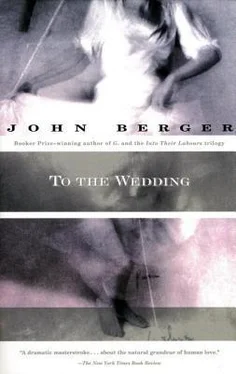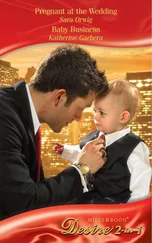John Berger - To the Wedding
Здесь есть возможность читать онлайн «John Berger - To the Wedding» весь текст электронной книги совершенно бесплатно (целиком полную версию без сокращений). В некоторых случаях можно слушать аудио, скачать через торрент в формате fb2 и присутствует краткое содержание. Год выпуска: 2011, ISBN: 2011, Издательство: Knopf Doubleday Publishing Group, Жанр: Современная проза, на английском языке. Описание произведения, (предисловие) а так же отзывы посетителей доступны на портале библиотеки ЛибКат.
- Название:To the Wedding
- Автор:
- Издательство:Knopf Doubleday Publishing Group
- Жанр:
- Год:2011
- ISBN:978-0-307-79420-8
- Рейтинг книги:3 / 5. Голосов: 1
-
Избранное:Добавить в избранное
- Отзывы:
-
Ваша оценка:
- 60
- 1
- 2
- 3
- 4
- 5
To the Wedding: краткое содержание, описание и аннотация
Предлагаем к чтению аннотацию, описание, краткое содержание или предисловие (зависит от того, что написал сам автор книги «To the Wedding»). Если вы не нашли необходимую информацию о книге — напишите в комментариях, мы постараемся отыскать её.
To the Wedding — читать онлайн бесплатно полную книгу (весь текст) целиком
Ниже представлен текст книги, разбитый по страницам. Система сохранения места последней прочитанной страницы, позволяет с удобством читать онлайн бесплатно книгу «To the Wedding», без необходимости каждый раз заново искать на чём Вы остановились. Поставьте закладку, и сможете в любой момент перейти на страницу, на которой закончили чтение.
Интервал:
Закладка:
The waves say Shooo! he says, and he nods towards the warder who is stationed on a chair, two metres away.
He wants to warn me not to talk in front of the screw. Talk about what?
You know why I’ve come to see you?
He says nothing.
I’ve come to kill you.
It’s so long ago …
Three years, I say.
I was coming to find you next day …
Once was enough! I tell him.
He lowers his head.
They nabbed me in the restaurant, he says eventually.
I’ve come to kill you. Do you understand?
You haven’t changed a bit, he said, you’re as dog as ever! And he smiles a true smile.
It’s terrible, this smile. It shows all the ravages done. He is not just thinner, he’s skeletal. I think of the soldiers in the train and our tunnel. At the end of his tunnel there is death and his train is almost there. There are marks on his face like burnt paper. I’ll be like this in one year, or two, or three, or four — the last figure is a lie, I’ll be like this soon, very soon.
I live in Italy and I’ve come a thousand kilometres to kill you.
He believes me. The screw is reading, bored.
I’m dying anyway, he whispers.
So am I! I tell him. At the age of twenty-four I’m dying, I’m like you!
When a small fear changes to a big one, the eyes dilate. This happens to his eyes now.
It can’t be, he whispers, his voice gone.
That’s what I said. I said it can’t be! And it is!
Jesus!
Five minutes pass without either of us saying a word. Our eyes go on a tour of one another, moving from exhibit to exhibit: wrists, collarbones, neck tendons, earlobes, hairline, eye pouches, nostril hair, chipped teeth, skull, chinbone. Then our eyes meet. I look into his blue eyes and he looks into mine.
Pardon me, he mumbles.
The same fucking words, I say to myself, the same words they use when they burp or fart or tread on your toe. So I scream as loud as I can.
I must have screamed very loud for the screw is at my elbow with a fist between my shoulder blades, propelling me out of the visitors’ room.
I think what I screamed was: We are ALL going to be pardoned! Do you hear me, Cook? Do you hear me, Screws? We are all going to be pardoned!
The road has been gravelled, so the signalman slows down.

Papa got off his bike and from his leather jacket he pulled out this box which had a ribbon round it. Inside were Les Coussins de Lyon. They were cushions but they were no bigger than the bowl of a coffee spoon! Their colour, a beautiful green with grains of silver in it, made me think of satin. And you could tell by their shape that the tiny cushions would have been as soft as pillows — if they had really been cushions! They weren’t, of course. They were too small and the silver was sugar and the green was mint and the fabric was marzipan. When you bit into one, your teeth went through the skin of marzipan and found truffle chocolate. What I didn’t eat that night when Papa came back from Grenoble, I took next day to school to share with Gyel and Jeanne and Annette, and we all agreed we’d only marry men who could promise us a constant supply of Les Coussins de Lyon!
There is the smell of tar coming off the road.
I have more old friends in the cemetery, Gino, than in the Paradiso Bar. It’s in the natural order of things that I end up there before you do, so long as you don’t fool around. I know what I’m talking about, I’ve handled a lot, Gino. Since your mother died we haven’t had a single argument, you and I. I don’t expect you to trade in my way — you have your own. And I’m proud of you. But tonight, for once, I have something to say, so listen to me. STOP, GINO. Make a clean break. This is what I have to say. STOP. I don’t know the mina in question, I’ve never met her. She’s French, you said. They’re easily blown, the French. Fly-by-nights. Your mina may be the exception, she may be the best Long-term Lorry on the road, your mina may be as beautiful as Gina Lollobrigida, but she’s condemned. If she’s infected with this abomination, she’s condemned. Worse, she’s dangerous. It’s pitiful if you think about it. She falls in with a band of cocaini , they shoot up together, they share a needle, they share a trip, and now they share a death. Povera pupa! But this doesn’t stop her being dangerous, Gino. You trade your way, but she’s dangerous. At the drop of a handkerchief, she’ll pass the same filth on to you. Let her go, Gino. It sounds to me as if she is asking you to do the same thing. Agree with her. Let her go … STOP. Otherwise you’ll be in the cemetery first.
Jean Ferrero leaves the main road to go through the town of Casale Monferrato. The street he is taking with its double arcades is very narrow. Over the roofs and in the passages between the houses there is a faint acrid smell of wine. All the wine of the region is delivered and sold here. The arcades beside the road are as narrow as Ninon’s room in Zdena’s flat. On the banks of the Po stands a château for the Dukes of Monferrato, where Cavour once stayed.
In the hospital lift people stare at me. Visitors, cleaners, patients, students. They all know. They don’t know how long, they don’t know when. They don’t know my T4 count. Yet they know. I can tell immediately on account of their eyes. What they have in common on account of their eyes is more important than all their differences. If I spot one who doesn’t know, I want to kiss her or I want to kiss him on the eyes. In the eyes of the others, of the ones who say to themselves She’s Got It, there’s horror. Horror can go with a kind of pity. True pity is different. True pity is what the Widow Bosson felt for the man trapped under the train in Maurienne. Horror is horror, even when it’s small and under control and is going with pity. In the lift seventeen horrors stare at me. I count them. We haven’t yet arrived at the Gastroenterology floor. So I put out my tongue, saying to myself: If one of them smiles, I’ll have a good night tonight. No smile. As I edge my way out towards the fifteenth floor, a male student mutters: Puttana!
Leaving Valenza, on the south bank of the Po, the road signs warn of an S bend. Jean Ferrero revs the engine, taps down to third, moves over to the crown to take the right-hand turn and leans over for a fraction longer than is safe, so as to be close to the right shoulder, at the moment when he shifts his arse and leans into the even sharper left bend. Then, as the straight opens out for him, he unexpectedly doesn’t accelerate but taps down through second to neutral and puts the bike on its stand on the grass verge.
Coming into the bend the signalman saw something. Now he walks back. A roadside shrine, about the size of a telephone box. The upper half of the rusty door has an open iron grille. Inside, under the stone arch, standing on a shelf, is a statue of the Madonna. Behind her are painted flowers on a blue wall that is peeling. With both hands Jean lightly grips the bars of the grille and peers through. She has a blue dress and her neck and face are the colour of a pale rose. Her head is inclined and her arms which hang loose are turned so that he can see her palms. Since he was a kid, Jean has not prayed, and then prayers were a form of recitation, with the Curé conducting them like a bandmaster. How to do it? He is a practical man. He can make a trap in the bottom of the backdoor for a puppy and the cats to go through, but how to pray through a grille? I read the question through his shoulder blades as he stands there. And I know how he replies. When he’s fitting a window or hanging a door he first presents it, puts it up against the space where it is meant to go; then he can see what to do next more easily. In the same way he begins by presenting their pain. Presenting it to the statue. Through his shoulder blades I hear the words.
Читать дальшеИнтервал:
Закладка:
Похожие книги на «To the Wedding»
Представляем Вашему вниманию похожие книги на «To the Wedding» списком для выбора. Мы отобрали схожую по названию и смыслу литературу в надежде предоставить читателям больше вариантов отыскать новые, интересные, ещё непрочитанные произведения.
Обсуждение, отзывы о книге «To the Wedding» и просто собственные мнения читателей. Оставьте ваши комментарии, напишите, что Вы думаете о произведении, его смысле или главных героях. Укажите что конкретно понравилось, а что нет, и почему Вы так считаете.












